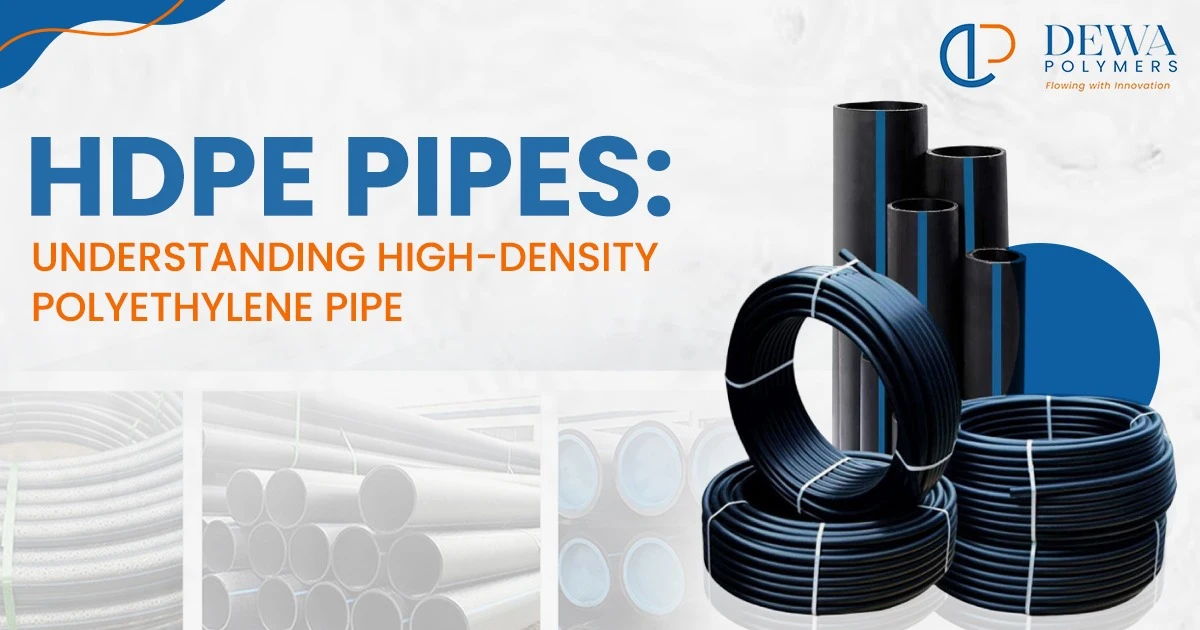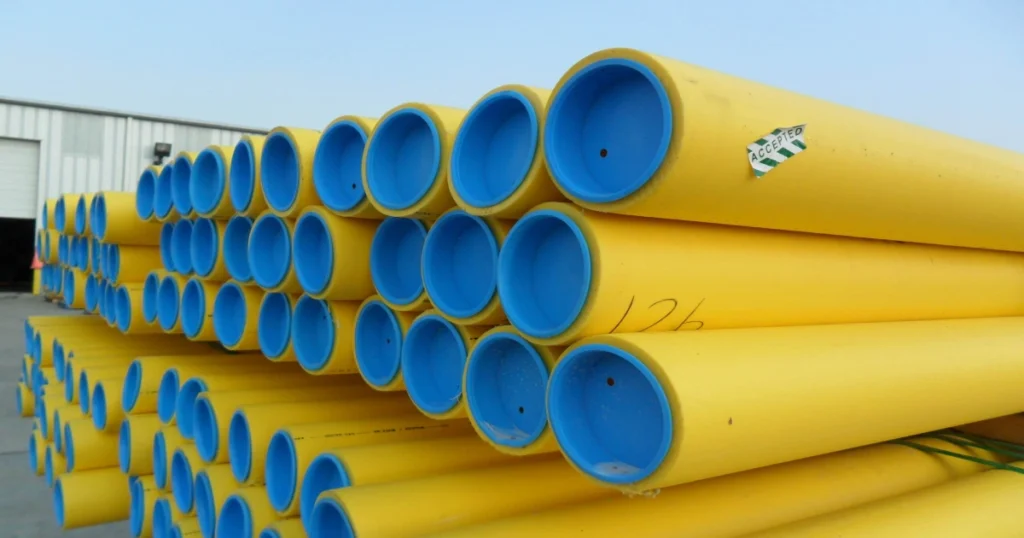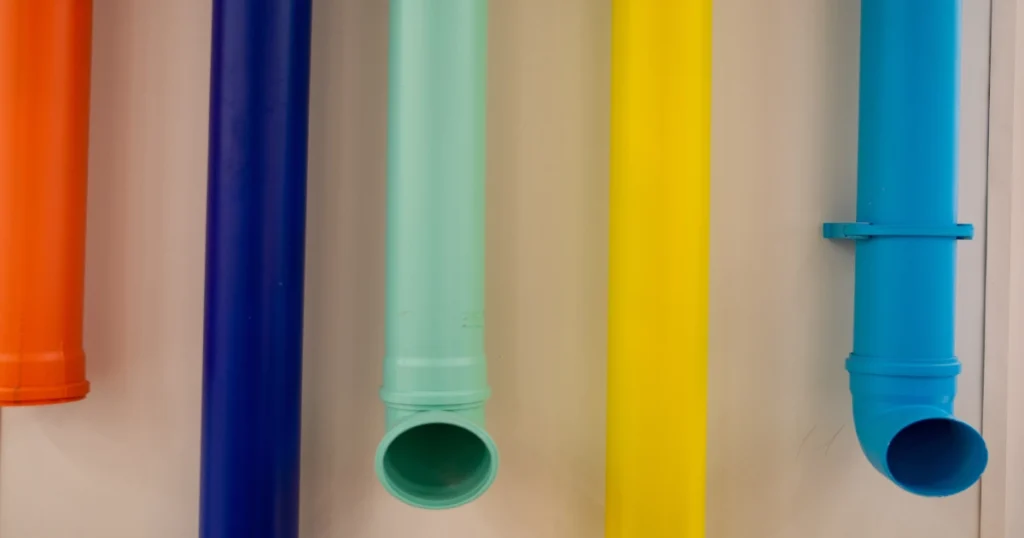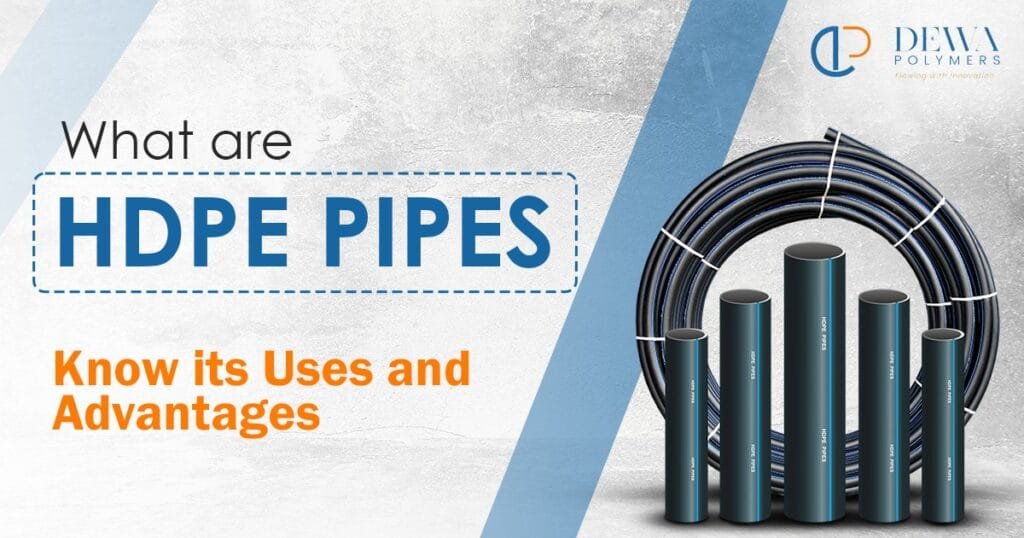Do you ever think about the complex network of HDPE (High-Density Polyethylene) pipes that bring water to your home or the never-ending strong pipelines that transport natural gas across our vast country? These essential systems mostly comprise HDPE pipes. So, what are HDPE Pipes? They are pipes made of polyethylene. However, this material gives the pipes some special features with benefits and advantages that have led to the popularity of high-density polyethylene pipes.
Among the many advantages of HDPE Pipes, are high quality, reliability of pipe and fittings, ease of loading and transportation of pipes and fittings of polyethylene due to their relatively low weight, and quick and easy installation.
In this comprehensive blog post, we’ll explore High-Density Polyethylene (HDPE) pipes and what makes them such a popular choice for municipal water supply and industrial chemical transportation. Come along to understand the versatility, durability, and environmental benefits of HDPE pipes.
HDPE Pipes: A Durable and Sustainable Solution
HDPE pipes are crafted from high-density polyethylene. Therefore, these pipes are a modern marvel in plumbing and infrastructure. Additionally, the lightweight yet incredibly strong pipes are resistant to corrosion, chemicals, and extreme weather conditions. Moreover, they have a long lifespan of 50-100 years.
Consequently, they offer a long-lasting and cost-effective solution for various applications. HDPE pipes are used in water supply, gas distribution, and drainage systems. Today, the demand for sustainable and efficient infrastructure has grown manifold. Therefore, HDPE pipes are fast becoming the preferred choice and contributing to a greener and are resilient future.
Advantages of HDPE Pipes
The primary benefits of HDPE plastic over other materials giving it the celebrity status it deserves are:
- Low friction coefficient and low moisture absorption
- High strength-to-weight ratio
- They have high impact strength and can resist dents and scratches
- Mold, mildew, rotting, mineral acids/bases, soil, and weather-resistant
- Very malleable when heated and experiences medium to low shrinkage
- Easily recycled
- They can be sterilized after boiling, do not harbour bacteria, and is dishwasher safe
- Replaces heavier materials in some applications
- As the HDPE pipes are lightweight and flexible, they are suitable for installation and easy to handle. Moreover, they require very little equipment.
- HDPE pipes have lesser installation costs as they need fewer fittings and have seamless joints.
- Also, their long lifespan and low maintenance contribute to significant cost savings in the long run.
- HDPE pipes have greater resistance to corrosion, chemicals, and extreme weather conditions.
- HDPE pipes have enhanced structural integrity as their heat-fused joints create strong, leak-proof connections.
What is High-Density Polyethylene (HDPE)?
Putting it simply, it is a thermoplastic polymer derived from petroleum with a generalized chemical formula (C2H4)n. Therefore, the HDPE formula represents the repeating monomer unit of ethylene and forms a poly-ethylene molecular chain. Also, HDPE is differentiated from other forms of polyethylene as its side chain branching frequency is lower than other polyethylene types. Also, HDPE is commonly referred to as a “linear” chain.
Consequently, this linear structure allows HDPE to pack together tightly. Further, this is the reason for its impressive material characteristics.
Application of HDPE pipes
HDPE pipes are widely used in various applications because of their many advantages every day, this wonder material is used in applications and therefore, the polyethylene pipe has become an alternative for other types of pipes. Today, we see High-density polyethylene (HDPE) pipes being applied in urban, industrial, marine, drilling and agricultural pipelines.
Also, the polyethylene pipes durability has been proven at ground level, buried state, floating situation, and sub-surface levels. Incredibly, polyethylene pipes are suitable for transporting drinking water, sewage, chemicals, slurries, and also hazardous wastes and gases.
Features of the Polyethylene Pipes
Explore the remarkable properties of polyethylene pipes that contribute to their widespread use:
Low weight
Polyethylene Pipe and HDPE Pipe Fittings are easy to carry, load, and install as they have a lower weight than other types of pipes, such as steel pipes and concrete pipes. Moreover, they are resistant to very low temperatures. Also, the strength and durability and high elasticity of polyethylene make them suitable to be carried and installed in various industrial projects.
Impact resistant
Polyethylene pipes are highly resistant to impact. Therefore, there is no need for higher pipe pressures and polyethylene fittings. Also, it eliminates the purchase of anti-shock equipment. Consequently, making the implementation very easy and reduces the costs of implementation in large industrial projects. Also, minimizing waste to zero.
Erosion resistant
The pipes and fittings made of PE offer resistance against erosion therefore they are a perfect choice for transferring fluids with non-soluble solids. Moreover, they are safe from pests and rodents due to high surface rigidity.
Chemical resistant
PE pipes and PE fittings are resistant to acidic and basic chemical environments. Therefore, making them suitable for various applications.
High flow rate
PE pipes and fittings have smooth walls with very low roughness. Therefore, facilitating fluids with a rapid flow within them.
Types of Polyethylene Pipes
Polyethylene pipes come in various types, each tailored to specific applications.
Learn about the different types of polyethylene pipes and their unique characteristics:
Single-wall polyethylene pipe
Single-wall polyethylene pipes are unique. Moreover, they can be used between 2 and 40 bars pressures, with different diameters. Also, these pipes are used more in the transmission and distribution networks compared to other types of pipes.
Double-wall corrugated polyethylene pipe
The corrugated double-wall polyethylene pipes are designed for underground fluid transportation. Moreover, they are primarily suitable for handling acidic, sewage, industrial, and basic effluents. Also, the outer corrugated layer provides structural strength to withstand external pressures. Further, the smooth inner layer ensures efficient fluid flow. Therefore these pipes are highly suitable for non-pressure applications and rely on gravity to move the fluid.
Spiral polyethylene pipe
Spiral polyethylene pipes are used for larger diameters, ranging from 800 to 3000 mm. Also, they are produced using spiral winding. Moreover, these pipes offer high strength and are capable of withstanding significant external pressures. Also, the working pressure of spiral corrugated pipes is based on the thickness of the wall and the spacing between the corrugations. Moreover, they are connected using butt welding or extrusion attachment.
Application of Polyethylene Pipes
Polyethylene pipes, including HDPE, are ideal for transporting various fluids in diverse settings. Moreover, they are reliable and cost-effective, suitable for underground, above-ground, and marine applications.
Uses of polyethylene pipes:
- Urban and rural water supply networks
- Urban and rural sewage networks
- Gas supply networks
- Drainage networks
- Industrial Liquid and Sewage Systems
- Irrigation systems under pressure (drip and rainfall irrigation)
- Movable irrigation systems
- Covering telecommunication cables and fiber optics
- Covering Power Cables
- Covering metal pipes
- As ventilation ducts
- Dredging systems
- Transfer of chemical fluids and industrial products (according to standard)
Conclusion
HDPE pipes are reliable and efficient solutions for a wide range of applications, from water supply to gas distribution. Also, their superior performance, coupled with their environmental friendliness, makes them a preferred choice for modern infrastructure projects.
If you are ready to elevate your infrastructure projects, you can consider partnering with Dewa Polymers Ltd., the pioneers in manufacturing high-quality HDPE pipes and telecom ducts.
Moreover, their state-of-the-art manufacturing facility ensures the timely delivery of products that meet the highest industry standards.
So, take the first step towards a sustainable future. Call us at +91-9859920603 to know more about our products.










